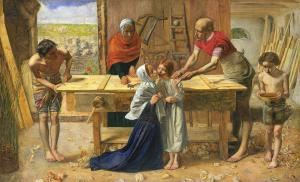There are a lot of members of the Broad Chorus of Catholic Thinkers posting articles, videos and podcasts online. So much in fact that one really doesn’t have the time, energy or computer bandwidth to read all the good things being written up and slapped on a web page. And so I decided to bring examples of a 132 of them together in one post. It consists of bits of Orthodox Catholic thoughts from the Catholic Rigorous Vortex and the Liberal Hippie Catholics and everyone else in-between.
WRN # 18 Cool Tunes From the Broad Chorus of Catholic Thinkers
Easy Access to Tunes and Tweets from the BCCT JULY 29, 2022
The diversity of thought within Catholic teaching, like variety within the strictures of sonnets, is one of its most beautiful features. It is nevertheless important to listen, as much as we can, to a broad chorus of Catholic thinkers. I have found great consolation in the fact that someone holier and smarter than myself has likely asked my questions already; my job is to find them and to listen, and then to make as many people as possible read block quotations about it.
Sharon Kabel , OSB vs. UFO: Stanley Jaki and the Theology of Aliens (June 16, 2021)- OnePeterFive
But of course with so many samples of things to look at in one semi-long post, several nifty, pithy and unique writings and more can get lost in the shuffle. So I decided to take what I gathered and break it up into smaller posts based on themes instead of particular individual Catholic websites. I even added a few other things not found in the larger collage of writings.
In this issue I present to you tunes from the BCCT on…
Family Life and Other Relationships

Marriage
Marriage is hard to do well. It requires a level of selflessness most people are incapable of sustaining on their own. God’s grace fills in the cracks. Your spouse cannot fill you. That’s God’s role in your life.Family members and friends will pass away. Jobs will be won and lost. You will make your home in different places, and be called to uproot yourselves and start anew. Children will be born and grow up. Sickness and death will come for each of you. Joys and hardships will unfold. You will endure all of this – and more – together.
Your marriage is not just about how you feel in this moment. In fact, much of marriage is not how we “feel” at all. It’s about what we know is true. Feelings are fleeting; they turn on a dime.
The earthly life and the spiritual life are a series of peaks and valleys, and the landscape is ever-changing. There is one unchanging element in your marriage. Cling to that. It is God.
When you join yourself to another in Holy Matrimony, you become a stepping stone to God. Consider it your job to get your spouse to heaven. Work for it, pray for it, sacrifice for it, and embrace it. There is no greater way to show your love than to work for the sanctification of your beloved.
Cheryl Hadley The Marriage of All & Nothing –(Jun 14, 2022) The Catholic Company®’
Marriage Prep
Essentially, marriage preparation as it exists today cannot do the job of a robust, supportive family, community and parish life. These types of strong communities—and not workbooks, questionnaires and seminars—ideally should be teaching Catholics from a young age what marriage ought to look like. They should be modeling fidelity and forgiveness, demonstrating how cooperation and mutual submission work in real life and revealing how normal it is to face and work through times of trials and suffering. And they should be supporting them when the inevitable times of confusion and difficulty arise.
What Catholics actually want and need from marriage preparation – SIMCHA FISHER
The Catholic Church and Cohabitation
The Church Community is aware of the societal, economic, and cultural influences that weigh so heavily on all of us, and that leads many young Catholics to opt for cohabitation. Our objections are not borne of prudery or an “old-fashioned” worldview. The Church has observed the devastation and unhappiness that has been caused by the weakening of the institution of marriage and the breakdown of family life. Our criticism of cohabitation is not one of self-righteousness, but rather of true pastoral concern for the spiritual well being of our people and the future of society where materialism and individualism are undermining the common good.SEAN CARDINAL O’MALLEY, OFM CAP. Cohabitation (JUNE 25, 2002) (catholicexchange.com)
The Catholic Church and Divorce
The Catholic Church does not recognize divorce for valid sacramental marriages. The Church teaches that “God himself is the author of marriage” and a union between two people is also a union between themselves and God. In the bible, Jesus speaks of marriage;
“Therefore what God has joined together, no human being must separate,” (Mark 10:9)
A marriage can only end in the eyes of the Catholic Church when one partner dies or there are grounds for annulment. Even if a couple has obtained a legal divorce, they are still considered married ‘in the eyes of God’ unless they obtain an annulment from the Church.
Annulments can only be granted by the Church if it can be proven that the marriage was ‘not valid’. To make a marriage valid, a couple must:
- Marry freely and without reservation
- Love and honor each other for life
- Accept children lovingly from God
If any of these conditions were not met, the marriage can be declared invalid and the couple can apply for a decree of nullity to be granted. Once this is granted, the couple are free to remarry in the Catholic Church.
Jimmy What do Modern Catholics Say About Divorce? (September 5, 2020) (insidecatholic.com)
The Catholic Church and Gay Marriage
The main reason why the Catholic Church will never allow same sex weddings: because we believe that marriage is a sacrament and we can’t change the content of the sacrament. A marriage is between one man and one woman for life and we can’t change it any more than we can say the grass is purple or the sky is green. We can’t change the content of the sacrament because that’s the way things are. We can’t change the content of marriage any more than we can say baptism is now putting ashes on your head instead of water.
If we don’t allow same sex weddings we don’t allow polygamy or remarriage after divorce for the same reason. We can’t change the sacrament. The sacrament is a given. It’s an ontological reality. Saying we can change marriage is as impossible as saying that water is no longer a molecule with two atoms of hydrogen united with one of oxygen.
This doesn’t mean that we hate gay people. It doesn’t mean that we are racist and bigots. We can even grant that homosexual people show love to one another. We can admit that they may establish a civil union or live together. They may do as they please. They can even call what they do “marriage” if they wish, but that doesn’t make it marriage and it certainly doesn’t make it a Catholic sacrament.
Fr. Dwight Longenecker Why Are Catholics Against Gay Weddings and Women Priests? March 31, 2015
The Catholic Church and Homesexual Inclination
While the Church teaches that homosexual acts are immoral, she does distinguish
between engaging in homosexual acts and having a homosexual inclination. While the former is
always objectively sinful, the latter is not. To the extent that a homosexual tendency or
inclination is not subject to one’s free will, one is not morally culpable for that tendency.
Although one would be morally culpable if one were voluntarily to entertain homosexual
temptations or to choose to act on them, simply having the tendency is not a sin. Consequently,
the Church does not teach that the experience of homosexual attraction is in itself sinful.
USCCB, Ministry to Persons with a Homosexual Inclination: Guidelines for Pastoral Care, November 14, 2006 ,
Sexual Meaning
When I say that good sex is reciprocal, I do not mean only that it is mutual. If I desire you and you desire me, this isn’t simply a convenient pairing as when, for instance, I want to buy a pair of shoes and you want to sell a pair. What each of us desires isn’t a preexisting thing, which the other person can give us access to or withhold (such as our bodies, or permission to do certain things to them). Instead, our desire for one another has a reciprocal quality. Part of my desire for you includes a desire for you to want me. My desire for you also entails wanting you to delight in my desire for you, and for your experience of my desire to increase your desire for me.
Audrey Pollnow What Sex Really Is by Audrey Pollnow |(June 2022) Articles | First Things
Family Life
Being a Better Mom
Being a Father
Being a father is an embodied thing—biological, psychological, social, legal. It is—or should be—a total thing, owning wholly the man who dares to become a father. Which is why it is also an exhausting thing; it is weariness both moral and beautiful. It is a profound thing; it changes fundamentally the man made a father, deeply and hopefully for the better. At least, it should. At least, it did me. At least, I hope.
Joshua J. Whitfield A married Catholic priest’s lessons from two kinds of fatherhood (June 17, 2022) America Magazine
Being a Senior
Dear grandparents, dear elderly persons, we are called to be artisans of the revolution of tenderness in our world! Let us do so by learning to make ever more frequent and better use of the most valuable instrument at our disposal and, indeed, the one best suited to our age: prayer. “Let us too become, as it were, poets of prayer: let us develop a taste for finding our own words, let us once again take up those taught by the word of God”.[6] Our trustful prayer can do a great deal: it can accompany the cry of pain of those who suffer, and it can help change hearts. We can be “the enduring ‘chorus’ of a great spiritual sanctuary, where prayers of supplication and songs of praise sustain the community that toils and struggles in the field of life.
Pope Francis’ message for 2nd World Day for Grandparents and the Elderly | Salt + Light Media (slmedia.org)
Being a Kid
I want my own children to be able to play a hockey game with others, for more than two minutes at a time. I want them to not feel like social outcasts because they do not, in fact, have a pocket device with instant access to pornography. But even beyond my own kids, I want all children to experience a real life, in the real world. A real world where tree forts are built, rabbits snared, prayers offered, traditions passed on, knees scraped, and books read. A world where actually skating with a friend on a Saturday afternoon is not some great counter-cultural act. Quite frankly, I want more for our youth than the numb world we seem to be passing on to them. I want for them to be given a real life to live. To rephrase Tolkien, the world is not found in TikTok and Snapchat. It’s out there.
Dan Millette (March 28, 2022) A Novel Approach to Internet Addiction – OnePeterFive
Loving Kids Like Hell
Treat them as what they are. They’re the King’s kids. You’re His foster parents.
Loving like Hell is tough as Hell. The older and more hellish they get, the greater your love must grow. A fierce love, tough love, gentle love, merciful love, demanding love, joyful love, constant love, humble love, bold love, public love, secret love, sacrificial love, repentant love, sweet love, bitter love, laughing love, weeping love, truthful love, prudent love, patient love, undying love, and every other form of love that a human can draw from the infinite fountain of love springing from the side of the dead, love-spent Christ.
Do that, and one day we will celebrate your feast day in a lonely Catholic Church in south Sudan and a new generation of parents will awaken to the tiny gifts God has entrusted to their care.
Dr. Tom Neal, Kreeft, Kids, and Cattle (AUGUST 18, 2016) Word on Fire
Pope John Paul 1 and Birth Control
On the eve of the World Meeting of Families and with a view toward the beatification Sept. 4 of Pope John Paul I, attention turned to his initial openness to softening Catholic teaching on contraception and his later support for the teaching of St. Paul VI.’
The editorial director of Vatican News, Andrea Tornielli, and the vice postulator of St. John Paul’s sainthood cause, Stefania Falasca, both focused in June on a document drafted in 1967 by then-Bishop Albino Luciani of Vittorio Veneto — the future pope.
“In the course of that conference he had said, ‘For me this is the biggest theological issue that has ever been dealt with in the church. When there was Arius or Nestorius and they were talking about the two natures in Christ, they were serious issues, yes, but they were understood only at the top of the church, by theologians and bishops. The poor people understood nothing about these things and would say, ‘I adore Jesus Christ, I love the Lord who redeemed me,’ and it was all there, there was no danger.”
When, however, the pope published Humanae Vitae, Luciani acknowledged the disappointment of many Catholics, but insisted the pope “put his trust in God” and was inspired to uphold “the constant teaching of the magisterium in this most delicate matter in all its purity.” ‘
Cindy Wooden of Catholic News Service John Paul I and the pill: He wanted change, but accepted ‘Humanae Vitae’ (Jun 23, 2022)– Catholic Review
On Relationships With Others
Friendship
Beyond the narrow limits of the family, affection may extend within a wide circle of friendship. The Man-God was pleased to have friends on earth, and He has deigned to assemble them around Him in heaven. Following His example, the holiest persons have given free vent to the tenderest feelings of their hearts: all have had friends, chosen out of a thousand, and all have rejoiced in the thought of knowing and loving them in eternal repose.
Now, one of the joys of these true friends will be their mutual recognition. St. Ambrose thought so when he commented on the following words of our Savior: “I have called you friends, because all things whatsoever I have heard of my Father I have made known to you” (John 15:15). By these words our Lord has given the model of friendship for us to copy. We must reveal to our friends all the secrets of our hearts, and we must not remain in ignorance of theirs. A friend conceals nothing. If he is sincere, he opens his mind as our Savior disclosed the mysteries of His Father.
François René Blot, S.J. Friendship in Heaven (JANUARY 18, 2021) (catholicexchange.com)
The Disabled
Imagine going to Mass and not being able to get into a church building. Imagine going to confession and not being able to get into the confessional. Imagine a priest telling you that you are a burden to your parents. Imagine not being able to get on to the altar to be a lector, altar server or eucharistic minister.
As a lifelong wheelchair user, I have learned that many of the daily hassles, disappointments and discrimination that I experience in everyday life also occur in the Catholic Church.
I was a faithful parishioner, yet I consistently faced attitudinal and physical barriers that prevented me from truly feeling welcomed at God’s table.
Fighting ableism is a very lonely task, and often church is the loneliest hour of my week. The Catholic Church has a responsibility to welcoming the marginalized, including those with disabilities. How can we create a more accessible church that prioritizes the experiences of Catholics with disabilities? In order for persons with disabilities to be fully integrated into church, we must be invited and welcomed to participate in ministry, parish council and community events. As we work to make the church a more welcoming place for all, we must never underestimate the power of invitation.
Erin Murphy I am a lifelong wheelchair user and I don’t feel welcome in the church | National Catholic Reporter (Apr 5, 2021)(ncronline.org)
Positivity vs. Negativity
Last night, I complained (on social media; where else?) about how we published a fantastic, moving, uplifting story about an incredible saint — St. Marianne Cope — who took the awful lives of lepers and turned them into something full of beauty and wonder, but that it only had 27 shares.
Meanwhile, my snarky post about Cardinal Wuerl getting millions of dollars in retirement hit 500 shares right out of the gate.
Now, my complaining seemed to have done some good for once. The St. Marianne Cope piece now has over 220 shares and counting, whereas the Wuerl piece is stuck right where it was.
But it had me up last night thinking about all of this stuff. About the fact that since I started trying to do a lot more St. Marianne Cope-type pieces and fewer Wuerl-type pieces, traffic on this website has dropped faster than Gavin Newsome’s approval rating. Whereas in 2018, at the height of all the Vigano revelations, we were getting somewhere between 25-30K pageviews a day, lately, we’re at fewer than 10K. In fact, we haven’t broken the 10K barrier in the past 30 days. Not even once. There could be several reasons for this, but traffic metrics over time tend to be a semi-reliable indicator about whether the content you’re producing is what your audience wants to consume.
In theory, we want to know about the good stuff. The stuff that’s positive and motivating and helps us to live better, more virtuous lives. The stuff that helps us to be inspired to make changes in the right direction.
But the minute someone drops a nasty, negative, outrageous story in front of us, we swarm like flies.
Steve Skojec, Negativity is a Drug, And We’re Hooked (March 5, 2021) OnePeterFive
Social Media Etiquette
Twitter and social media in general are not usually seen as platforms that display civilized discussion and insightful conversation, but it doesn’t have to be that way. As Catholics, our interaction with the world should be exemplary. We should be a light in the darkness, a city on the hill (Mt 5:14). That applies to all areas of life, including social media. Our online presence should be radically distinct from the swathes of Twitter mobs that plague the internet. No platform is incompatible with Catholicism. But they all require sanctification. And there can be no sanctification without an intention to grow in personal holiness.
Jonathan Quist A Digital Etiquette – A Catholic Guide for Using Social Media (March 30, 2022) The Catholic Gentleman
Other Related Posts include
Using The Kind Gaze to Look Past Splinters
The Rites of Write(ing) – A List of Catholic Authors and some of their books.
Surfing the Catholic Web
Tweeting to the Choir: A Collection of Tweets













